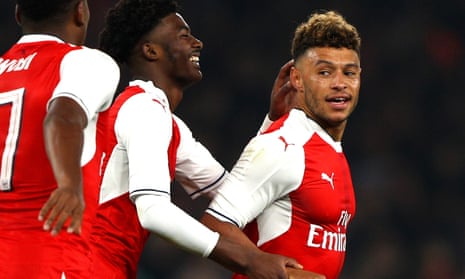To Arsène Wenger, it remains one of the “craziest games” of his 20-year Arsenal career. When his team defeated Reading 7-5 at the Madejski Stadium in the League Cup four years ago, it was an occasion that tested the boundaries of credibility. It is possible that there might never be another game quite like it and, on this occasion, Wenger could content himself with victory against the same opponents, by the same margin and in the same competition but with rather lower levels of stress.
The Arsenal manager played his second string, as he had in the previous round at Nottingham Forest, and it was Alex Oxlade-Chamberlain who made the difference.
The winger scored both of the goals – the first, a vicious low shot after a Reading defensive breakdown; the second, a have-a-go hit that deflected in off Jordan Obita – and, all of a sudden, Arsenal are into the quarter-finals.
All of a sudden, Oxlade-Chamberlain has five goals in all competitions this season; it represents his best return over a campaign in an Arsenal shirt and he has given Wenger another nudge when he considers his selection for the Premier League.
Oxlade-Chamberlain has started only three league fixtures so far this season and he has spoken of how he might have to consider his future at the club if the situation does not improve. Happily for Wenger, it appears that he and Theo Walcott are inspiring each other to greater heights on the right flank – Walcott has started the season in fine form – and the Frenchman seemed to suggest that, at 23, Oxlade-Chamberlain was coming of age.
“Before, you felt he acted in front of goal like he didn’t deserve to score,” Wenger said. “Now, he has added some belief to his finishing and we have hope that every time he has the ball, something can happen. He has worked a lot mentally to be really focused. He is not a young player any more. At 23, you become a player who is a finished article.”
Jaap Stam, the Reading manager, enjoyed a few battles with Wenger when he was a Manchester United player. His debut for the club came in the Charity Shield defeat to a Nicolas Anelka-inspired Arsenal in 1998 and he was a part of the United team that edged the famous 1999 FA Cup semi-final.
There was to be no fairytale for him here and Reading never truly threatened to record a first victory over Arsenal at the 14th time of asking.
The visitors were neat and tidy, and they remained true to the passing principals that have marked Stam’s fledging managerial career.
He is from the Dutch school and, in his first managerial job, he has made it plain that he wants to build from the back and play along the ground.
Unfortunately for him, Oxlade-Chamberlain’s first goal was an illustration of what can happen when the best of intentions go wrong. Joey van den Berg came short for an Ali Al-Habsi goal-kick but it felt like a risk for the Reading goalkeeper to play it to him.
He did so, regardless, and Van Den Berg felt the pressure from the red shirts that surged towards him. He could do nothing more than flick the ball in the direction of Oxlade-Chamberlain, who collected it and darted into the area. Tyler Blackett did not get close enough to him and Oxlade‑Chamberlain fizzed a low shot into the far corner.
Reading failed to quicken the pulses of the vociferous travelling supporters too regularly in the first half and it was Wenger’s team who came to call the tune. Carl Jenkinson, playing his first game for Arsenal since May 2014, worked Habsi in the early running while Lucas Perez squared weakly towards Jeff Reine-Adelaide when clean through and Tennai Watson got back to challenge. There was also the moment when Ainsley Maitland-Niles curled narrowly off target.
Stam sent on Yann Kermorgant on 56 minutes and the striker’s first involvement was to leap and extend Emi Martínez with a firm header. But it was Arsenal’s substitute centre-forward, Olivier Giroud, who entered to a great ovation, who helped Arsenal to turn the screw.
Giroud drew a marvellous save out of Habsi with a header and, in the scramble that followed, Liam Moore cleared off the line.
Alex Iwobi would mess up a glorious chance after Habsi had denied Oxlade-Chamberlain and Iwobi also saw a blast tipped over the crossbar.
Arsenal were getting closer and they found the knockout punch after an unlikely run to the byline from the centre-half Rob Holding and a lay-off from Giroud. Oxlade-Chamberlain could argue that he had earned his break off Obita. Reading were denied a late consolation when Martínez made a fine double-save to deny Liam Kelly and Dom Samuel.

Comments (…)
Sign in or create your Guardian account to join the discussion